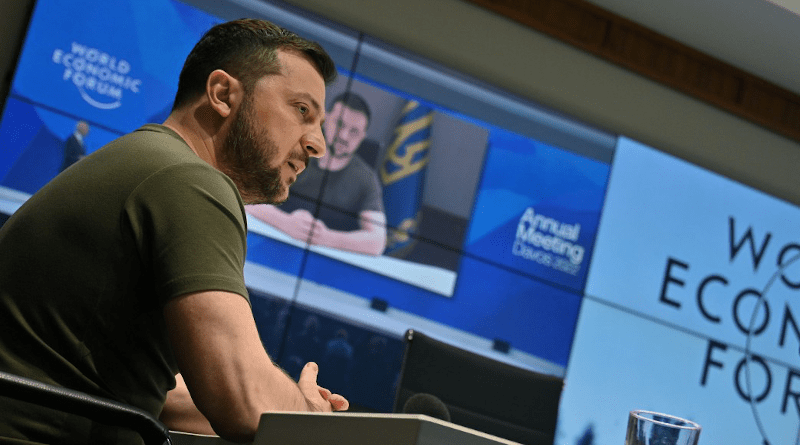Zelenskyy Tells Davos Thousands Of Lives Could Have Been Saved Had West Acted Faster
By EurActiv
By Alexandra Brzozowski
(EurActiv) — Ukraine’s President Volodymyr Zelenskyy appealed for more weapons and “maximum” further sanctions against Russia on Monday (23 May), as he declared that tens of thousands of lives would have been saved had the international community acted faster.
Addressing global leaders at the Davos World Economic Forum via video link, Zelenskyy said the current war would show “that support to the country under attack is more valuable the sooner it is provided: weapons, funding, political support and sanctions against Russia”.
“History is at a turning point (…) This is really the moment when it is decided whether brute force will rule the world,” Zelenskyy added.
“This is why Ukraine needs all the weapons that we ask for, not just the ones that have been provided,” he said, adding that 87 people were killed in a 17 May Russian strike on a military base in northern Ukraine.
End all Russia trade
Zelenskyy didn’t mince words criticising the EU side for not imposing sanctions back in February before the war started, despite the Ukrainian government’s appeals.
“Sanctions should be preventative; not just imposed as a response,” he said, claiming that if the full range of punitive measures had been applied against Russia, this could have prevented war.
“Support to the country under attack is most valuable the sooner it provides funding. If we had received sanctions, at once, back in February, the result would be tens of thousands of lives saved,” Zelenskyy added, appearing on a screen flanked by Ukrainian flags and wearing his trademark olive-green T-shirt.
He called for an immediate oil embargo on Russia, punitive measures against all its banks and the shunning of its IT sector, adding that all foreign companies should leave the country.
“There should not be any trade with Russia,” he told the audience.
“I believe there are still no such sanctions against Russia – and there should be,” he added, in what was a veiled reference to the EU not being able to agree on the sixth sanctions package for weeks due to several member states’ objections.
While the United States, Britain and Canada have moved to ban Russian oil and gas, the European Union has been divided over imposing similar measures.
EU members such as Germany and Hungary are heavily dependent on energy supplies from Russia, with Budapest bargaining a price to lift its veto.
Zelenskyy also called for all Russian assets to be seized or frozen, and then allocated to a special fund that would be used for reconstruction.
A similar idea has been already floated by EU officials, but it yet remains unclear how legally sound such a step would be.
Currently, some legal options are being explored, but there are worries that in certain cases the measures could be challenged in court, EU diplomats told EURACTIV.
Asked by World Economic Forum founder Klaus Schwab about what his main requests would be to global leaders, Zelenskyy replied: “A thousand of them. I’m not sure if I would have time. Ukraine is short of time.”
Schwab praised Zelenskyy for his “courageous leadership” and said Davos participants were eager to hear how they could assist Ukraine “because everybody is affected by what’s happening in your country.”
Russia’s war in Ukraine is dominating the four-day meeting of the world’s business and political elites, with Kyiv sending a strong contingent of officials, including Foreign Minister Dmytro Kuleba, Digital Minister Mykhailo Federov, Kyiv Mayor Vitali Klitschko, several members of the Ukrainian parliament, and the mayors of Bucha and Mariupol, to plead for more aid.
Russian business and political leaders, who used to participate in previous years, were barred by organisers from attending this year’s gathering over the war.
The Ukrainians have transformed the “Russia House” in Davos, normally used by the Russian delegation, into the “Russia War Crimes House” to promote their cause.

